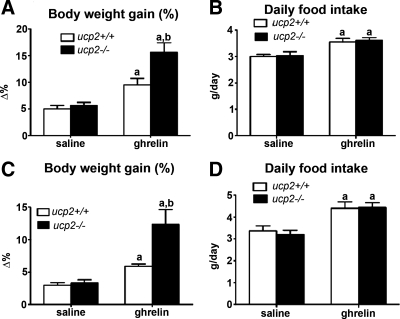Figure 1.
The lack of UCP2 increases weight gain in response to ghrelin. A, ucp2−/− mice show increased body weight gain after 14 d of ghrelin delivery via osmotic pumps relative to ucp2+/+ mice (10 nmol/d, n = 6–7, P < 0.05). Data are presented as the percent increase in body weight at the end of the 14-d treatment period relative to the starting body weight. B, Ghrelin via osmotic minipumps increased daily food intake (grams per day) in both ucp2+/+ and ucp2−/− mice; however, no difference between genotypes was observed (n = 6–7, P < 0.05). C, ucp2−/− mice show increased body weight gain, relative to saline injections, after daily ghrelin injections for 14 d (10 nmol, n = 6, P < 0.05). Data are presented as the percent increase in body weight at the end of the 14-d treatment period relative to the starting body weight. D, Ghrelin injections (ip, 10 nmol, n = 6, P < 0.05) increased daily food intake in both ucp2+/+ and ucp2−/− mice, although no difference between genotype was observed. This graph shows that ghrelin promotes greater weight gain in ucp2−/− mice independent of food intake. All data are expressed as mean ± sem. a, Significant with respect to saline controls; b, significant with respect to ucp2+/+ ghrelin.

